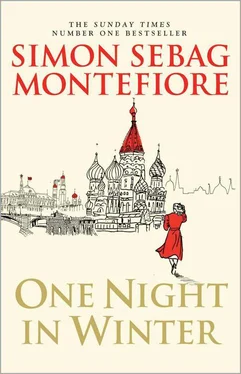‘I heard you say often that our planes were flying coffins for our pilots and that this was Stalin’s fault.’
‘Not true. I never said that. Not once.’
Losha seemed to doze off and was again tapped. This time he had difficulty finding his place on the paper so Colonel Osipov whispered to him. He nodded.
‘You were recruited as a spy for the Americans and Zionists.’
‘Never,’ retorted Satinov. ‘I’ve been a devoted Leninist since I was sixteen.’
‘One more thing, Losha,’ said Colonel Osipov.
‘Yes,’ said Losha, ‘you corruptly…’
Satinov held his breath.
‘…at the front, when you were at Rokossovsky’s headquarters and Berlin, you corruptly sold medical supplies from the Ministry of Health for personal profit.’
Satinov gazed into Losha’s soul, aware suddenly that they were close to dismantling his entire life. Just a step from Dashka herself. Prussia. Berlin.
‘I know everything,’ said Losha, tears running down his face. ‘You didn’t think I knew of your immoral actions. But I’ve told them – kerboosh – everything!’
Afterwards, Satinov had been taken straight to the station and put in a reserved compartment with two Chekist guards. Now, two weeks later, he had not yet fallen off the precipice, but he was teetering on the edge of an abyss into which he would inevitably draw Tamriko and the children, and perhaps Dashka and hers. The children of Trotsky had all been liquidated; the lovely daughter of Tukhachevsky sent to the Arctic Circle. So far, he was in limbo, neither alive, nor in heaven, nor hell. He was still so enchanted by Dashka that he was utterly numb.
Satinov’s absorption of his own downfall, Genrikh’s role in it and Losha’s betrayals, was constantly interrupted by a replay of his last meeting with Dashka in the Aragvi private room, a memory so vivid that he could smell, feel, taste her pleasure in a rainstorm of images and sensations. Even now, he could see the flash of her white teeth as they came together, panting and laughing, their kisses that tasted of white wine, the smile on her gorgeously crooked mouth, the satin of her bare amber-skinned thighs, and her sitting on him, over him, in the vain hope that a waiter barging into the alcove would never guess that he was deep inside her, demurely covered by her pleated white skirt.
‘You know this just can’t go on,’ she had said afterwards, seemingly as amazed by their behaviour as he was, her pupils dilated with excitement. ‘But don’t look so solemn. Kiss me one more time.’
Now, as these memories fragmented and spun away, he realized that if he didn’t extricate himself from his current predicament, he was well on his way to receiving the nine grams in the back of the neck, and sooner rather than later.
‘THIS IS FROM me to wish you a long and happy married life,’ said Senka, handing over a book entitled Western Philosophy Since 1900.
‘Darling Senka,’ cried Serafima. ‘I’ll treasure this forever.’
She was standing on the platform of the Belorussian Station in a flowery summer dress holding a little cream leather case as jets of steam blew white and feathery out of the train. All along the grimy platform, people were saying goodbyes in a myriad of permutations. Anyone seeing Serafima and her party would have presumed that they were schoolfriends and family despatching her on a holiday – but she feared that she would never see them or Russia again. And however much she was in love with Frank (who was waiting for her at his new posting in Paris) and looking forward to a new life in the West, she realized that the cliché was true: her soul was Russian and that meant she already missed Moscow, the diamond crystals of ice on her windows, the verses on the poet’s plinth in Pushkin Square, the silver birches in the forests, the hidden rushing of water beneath the snows as the thaw came, the ochre and duck-egg blue of old palaces – and that was before she had even looked into the eyes of her friends. The Dorov and Satinov children were all there to see her go. They had shared not just school but the Children’s Case too and so far she had only started to say goodbye to Senka. She was so moved that she could scarcely speak.
‘No offence, but your make-up’s all running,’ said Senka, but he too had started to cry and she took him in her arms, tiny in his Little Professor’s suit, and hugged him.
‘I know, darling Little Professor,’ she said. ‘Do I look awful?’
‘I’m afraid you do look scary, but I don’t care. I will always miss you and think of you as long as I live because you’ve always been my favourite grown-up, Serafimochka. And I will come and see you,’ he said. ‘Please reserve me my usual presidential-imperial suite at the Waldorf-Astoria Hotel!’
‘Do you promise?’ she asked.
‘Come on, Senka, you’re upsetting her,’ said Minka, pulling her brother away. ‘Serafimochka, good luck, my dearest friend. Promise to write soon and we’ll all have to visit you.’ She put her arms around Serafima and held her close. ‘To think it all started that day at the Bolshoi and you managed to keep it secret.’
‘The big boys always said you were a mystery,’ Senka laughed. ‘And they were right! I think it’s the biggest romance I’ve ever heard of, greater than all the romances of the medieval troubadours.’
‘Quiet, Senka, or you’ll make me cry again,’ said Serafima.
Her father climbed down from the carriage where he had been stowing her trunk. ‘God, that was heavy,’ said Romashkin, wiping his brow.
‘It’s got all her books in it,’ said Sophia Zeitlin. She was wearing a purple suit with a white mink collar and a wide-brimmed hat veiled in white chiffon. ‘Good luck, my darling.’
‘I’m missing you already,’ said her father. ‘Send us a telegram as soon as you arrive in Paris. Come back and see us soon or we’ll visit you too often!’ He wiped his eyes and Sophia hugged him as she had not done for years. ‘You’d better get in. You leave in five minutes,’ he added.
George took Serafima’s hand and helped her into her carriage where the best seat had been reserved. A uniformed steward asked if she had any cases to be put above the seat.
Senka jumped into the carriage and put his hand in hers.
‘As long as I live,’ he said, ‘I’ll always wish it had been me instead of that American. Am I really too young for you?’
‘Oh Senka,’ Serafima said, laughing through her tears, ‘out you get!’
The train groaned, doors slammed and the carriages creaked and shunted as if they were waking up. Senka and George jumped off the train. A whistle blew. Serafima heard someone calling her name, and looked through the Dorovs and Satinovs to see Andrei Kurbsky running up the platform. She leaned out of the window to say goodbye to him just as the train jerked into movement.
A puff of steam whooshed out as if the train had coughed. And then it was too late for any more farewells as the train moved away, leaving George and the Dorovs and Andrei Kurbsky waving and blowing kisses until she could no longer see them.
Dear Comrade Stalin, honoured father,
I committed grievous errors in my conduct of the aircraft industry. I am sorry that my mistakes and arrogance led to the loss of aircraft and brave pilots. I apologize. As a Bolshevik, I place myself humbly at the feet of the Party and of the Great Leader whose trust I have disappointed and whose wisdom I so need to succeed as a responsible Party worker. On my knees before you, esteemed Josef Vissarionovich, I admit my sins. Please punish me as you will. I am ready to perform any task high or low to help you lead the country and the Communist movement to more victories under your brilliant genius and visionary leadership.
Читать дальше












